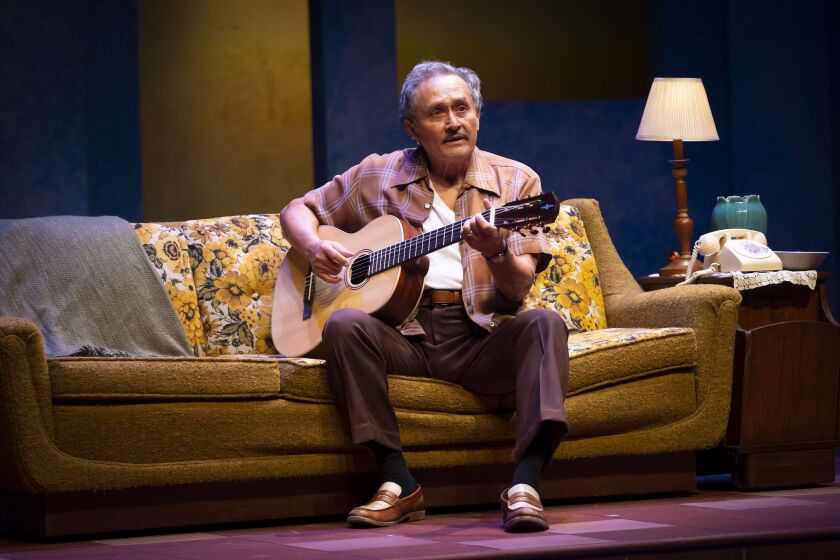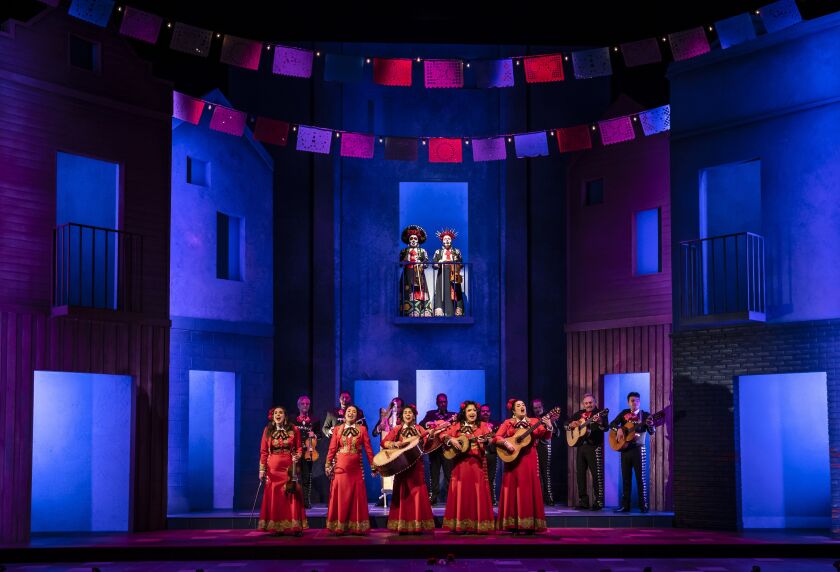Music is memory: It’s the refrain that pulses throughout the exuberant “American Mariachi,” José Cruz González’s play with music about the values of family, love, tradition — and the challenges to those ideals.
The play, which opened Monday night at the Goodman Theatre, begins with el grito, the throaty, primal shout that launches many Latin folk standards, and from that cry, “American Mariachi” breaks into the accelerating trumpet fanfare of “Son de la Negra,” the traditional classic regarded as Mexico’s second national anthem. For many Mexican Americans, the iconic song triggers a sense of welcome recognition that nuestra historia — our story — is about to be told.
This story, set in the ’70s in an unspecified American city, centers on the Morales family, whose trials and tribulations unspool against a backdrop of mariachi music (mariachi, a.k.a. ranchera, is the quintessential sound of Mexico). Federico (a spot-on Ricardo Gutiérrez), “an old school Mexican,” and a part-time mariachi musician, tries to keep his family rooted in tradition (and its attendant obligations) but his daughter, Lucha, a nursing student, yearns to break free of his paternalistic rule.
Haunted by the memory of her aunt Carmen, who drowned, Amalia, Federico’s wife and Lucha’s mother, is slipping away into a fog of dementia; she snaps back to life when hearing music — in particular, a boléro (ballad) written and specially recorded for her years ago. When the only record of that song is broken, Lucha (an effervescent Tiffany Solano) and her cousin Boli (Lucy Godínez, ebullient and sassy) decide to form an all-female mariachi so they can re-create the ballad for Amalia (Gigi Cervantes, winning at every turn) before she succumbs to her fate. Passed down from father to son, mariachi (then as now) remains the province of men, so Lucha and Boli face an uphill struggle.
Sones de México, the stellar Chicago-based, Grammy-nominated ensemble, serves as the play’s anchor, as it expertly performs classics of the genre, which set the mood and propel the action. Aided by family friend Mino (an excellent Bobby Plasencia), Lucha and Boli, along with Isabel (a beatific Molly Hernández), Gabby (Amanda Raquel Martínez, totally delightful) and Soyla (a scene-stealing Gloria Vivica Benavides), the women master their instruments and learn that mariachi demands “sacrifce and discipline” … and above all, respect.
The actresses, all accomplished, also learned their instruments in real life and shine in their musical numbers, in particular, an English-language version of the traditional dirge “La Llorona,” performed first by Lucha, then as a stunning duet in Spanish by Tía Carmen (the commanding Eréndira Izguerra) and Amalia as they are both decked out in cavalera (skull) face painting and traditional traje de charro suits. (Though primarily spoken in English, “American Mariachi” offers lots of dialogue in Spanish, but the meaning is clear throughout.)
Henry Godínez, the Goodman’s resident artistic associate, directs with his usual flair. “American Mariachi” is a co-production with Dallas Theater Center (where it was tabled in 2020 due to the pandemic) and is presented as part of Destinos, Chicago Latino Theater Alliance’s annual festival. Introduced three years ago in Denver, the play has had prior productions in San Diego and Los Angeles. Sets, costumes and lighting reflect colorful Mexican motifs — for instance, the water, earth, fire and wind symbols common to Day of the Dead celebrations, such as papel picados (lace banners).
Though a crowd-pleaser at every turn, the play crams many issues into its 95-minute, intermission-less running time: aging, family conflict, mental health, sexism, paternalism, assimilation, marital strife and women’s equality. As it careens between comedy and drama, often within the same scene, the production sometimes falls into an overbroad acting style more suited to a road-company edition of “Scooby-Doo.”
Ultimately, “American Mariachi” commands esteem as it celebrates a culture that is slowly disappearing, with giants of the genre either dead (Juan Gabriel and Joan Sebastian) or retired (Vicente Fernández). (On this year’s Latin music charts, so far only one ranchera song, “Tus Desprecios” by Pepe Aguilar and El Fantasma, has hit No. 1.) Kudos to “American Mariachi” (and Sones de México) for carrying on the tradition.
As Mino reminds the women, “This music was born from the ashes left by the sword and the cross, La Conquista, and from the embers emerged mariachi, which for generations, has filled ordinary people’s lives from birth to baptism, from marriage to death.” It tells a universal story as it also celebrates a community often marginalized in the arts, and for that, “American Mariachi” deserves enduring respect.







